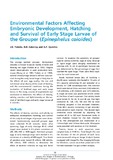Environmental factors affecting embryonic development, hatching and survival of early stage larvae of the grouper (Epinephelus coioides)
Share
抄録
These series of experiments were conducted to determine the effects of density (200, 400, 800 and 1600 eggs/litre), salinity (8, 16, 24, 32 and 40 ppt), aeration (0, 0.62, 1.25, 2.50 and 3.75 ml/min/litre) and light intensity (0, 120, 230, 500 and 700 lx) on the survival of fertilized eggs and early stage larvae of Epinephelus coioides. Under statice incubation conditions, the highest egg viability, hatching rate and percentage of normal larvae were obtained at a stocking density of 400 eggs/litre with moderate aeration (100 ml/min) and salinity of 32-42 ppt. Gentle aeration at 0.62 to 1.25 ml/min/litre, rearing water of 16 to 24 ppt and a light intensity of 500 to 700 lx maximized the survival of early stage E. coioides larvae in the hatchery.
Suggested Citation
Toledo, J. D., Caberoy, N. B., & Quinitio, G. F. (2004). Environmental factors affecting embryonic development, hatching and survival of early stage larvae of the grouper (Epinephelus coioides). In M. A. Rimmer, S. McBride, & K. C. Williams (Eds.), Advances in grouper aquaculture (pp. 10–16). Canberra: Australian Centre for International Agricultural Research.


